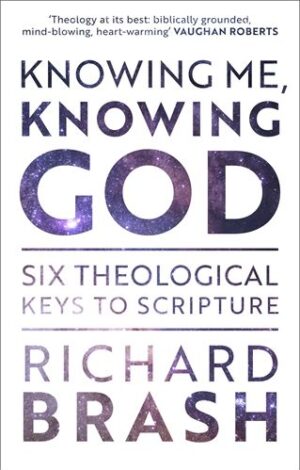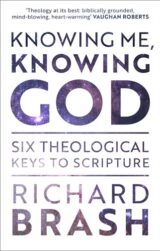Summary
The last dialectic pair of theological keys in KMKG focuses on ethical issues, in the category of acting. This is more than just the question of what is morally right or wrong: it is about who we human beings now are: sinners before a holy and righteous God. In this chapter/study, we focus on the ‘bad news’ that sets us up for the ‘good news’ revealed in the gospel, with the theological key Our sin separates us from God.
There are significant differences between human and divine acts. But there are some similarities. For example, like God we act freely, in the sense that we do what our ‘hearts’ desire. This grounds our moral responsibility: our acts are our own. As creatures, we owe God full obedience. We were created to act for his glory. But we fail to do so. God, on the other hand, can be described as ‘pure act’. He has no ‘potential’ in his essence to be what he is not. His will never changes. In perfect knowledge and power, he does the good that he pleases.
Adam, the first man, is significant for us all because of the covenant that God established with him and his descendants. We are included in this covenant. The covenant defines our ‘natural’ ethical status since Adam’s fall into sin: we are covenant-breakers, under a curse.
We are now constituted sinners. Our sin takes many forms, but in its many manifestations it always serves to confirm our ethical separation from God, who maintains his justice by ‘cutting off’ sinners. This is a solemn problem. In addition, we are ‘cut off’ or separated from one another. The depth of our brokenness is profound, and no-one is truly ‘neutral’ in their stance towards God. This ought to drive us to our knees to seek mercy at the cross of Jesus, who experienced the full consequences of being ‘cut off’ from God in the place of his people.
Aims of study
- To consider what it means for God and human agents to ‘act’.
- To understand what the Bible says about who we humans are ethical and what this means for our relationship with the God who is holy.
- To appreciate the significance of Adam for our ethical status, in the context of the covenant of creation or works, in which we are included.
- To see that God’s acts enable us to ‘name’ him, but they do not ‘define’ him, for God remains God apart from his acts.
- To recognise the effects of total depravity in our world and our own lives.
- To consider the severe consequences of the ethical separation from God that is caused by our sin, and to lament the depth of our brokenness before God.
- To understand ourselves (if we are believers) as involved in a spiritual battle of eternal significance.
- To see in the cross of Jesus the ultimate demonstration of the seriousness of sin.
Starter questions
- The early fifth-century British monk, Pelagius, wrote: The best incentive for the mind consists in teaching it that it is possible to do anything which one really wants to do.
What do you make of this suggestion? Where do you agree / disagree with Pelagius?
Questions to review understanding and for discussion
- Why do humans do what we do? (p. 106) (i.e. On what basis do we act?)
- What does it mean to say that God is ‘pure act’? (p. 107)
- What’s the problem with saying that Jesus is the definition of God? (p. 108)
- Why does our creation as God’s image obligate us to obey God’s law? (p. 110)
- What has the covenant with Adam got to do with us? (pp. 110-113)
- Can you explain the doctrine of total depravity? (p. 113) What does it mean, and what doesn’t it mean?
- What can we learn about sin from 2 Samuel 12 and Psalm 51? (pp. 114-115)
- What is God’s just judgment on sin? (pp. 115-116)
Bible passage: Psalm 37:35-40
- Brash lists the repeated references to God ‘cutting off’ the wicked in this psalm on p. 116. Where should you identify yourself in these verses? Are you the ‘wicked, ruthless man’? Or are you the ‘man of peace’ who is ‘blameless and upright’? Does verse 39 means that God helps those who help themselves? In this light, where should you place your hope?
Suggested application questions
- How does recognition of the depth of your sin and the solemnity of its consequences affect your relationship with God?
- Do you experience the ‘ethical dialectic’ that Brash describes on p. 120? What does it feel like, and how should we interpret those feelings?
- Given the reality of ‘noetic sin’ (pp. 121-122) how can we be sure that the true and sound wisdom we are pursuing in these studies is attainable?
- How might reflecting on the necessity of the cross of Christ lead you helpfully in your devotional life?
For further study
Some of the best books on sin – from a pastoral as well as a theological perspective – have come from the seventeenth-century Puritans, not least from the pen of John Owen. Owen’s works on sin and temptation have been brought together in a modern, updated edition with a foreword by John Piper, in Overcoming Sin and Temptation: Three Classic Works by John Owen (Wheaton: Crossway, 2006).
Another classic, from a slightly later period, is Thomas Boston’s Human Nature In Its Fourfold State (1720). There are various free versions of this available online, or there is a printed edition published by the Banner of Truth in 1964. Boston’s account of human nature in the state of ‘entire depravity’ elaborates on many of the themes in this study.


